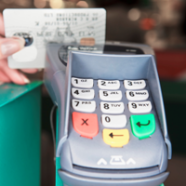Misuse of Authorization Fee
As a follow up to our article explaining Authorization Fees; we cover a Misuse of Authorization Fee in detail below. On October 1, 2009, Visa began to asses a misuse fee of $0.045 for authorizations that are not settled or reversed within certain time frames. These are sometimes referred to as “ghost” or abandoned authorizations. This fee commonly affects gas stations, ecommerce businesses as well as bars and nightclubs. How an Authorization Becomes a Ghost When merchants want to simply validate that a card is not stolen a simple authorization is used. This is common to open a tab, start a pump or initiate an order online. Merchants typically perform a $1 auth but this could be as high as $25 or even a few hundred. Unlike a normal transaction where an authorization is immediately followed with a capture, these types of transactions are “auth only” as the full purchase amount is not yet determined. The problem comes when the settling part of the transaction does not match the original authorization. It is commonly an issue with software that limits matching the original transaction but can also occur in a tab situation when the customer decides to pay with cash. How To Avoid Misuse of Authorization Fees Visa attempts to reduce ghost authorizations because they restrict the cardholders purchase limits and increases decline frequency. In order to avoid ghosted authorizations and misuse of authorization fees, merchants have 10 days to settle an authorization, except for Travel and Entertainment who must clear within 20 days. Merchants can also reverse card present auths within 24 hours and card not present within 72 hours by using the void process. In addition an alternate method to verify cardholder data called “Account Verification” can also be used. This is a $0 request and can include AVS and CVV data for added security. – To learn about authorization fees please visit Authorization Fees – To learn about voice authorizations please visit Voice...
Read MoreWhat is a Voice Authorization Fee?
As a follow up to our article explaining Authorization Fees; we cover Voice Authorizations in detail below. Read on for more information… There are three different situations that have been categorized as “Voice Authorizations” in the credit card industry. Although the first is the case most commonly referenced, the other two cases fall into the same bucket and hold the same fee to the merchant. Hardware / Software Failure or no Phone / Internet Connection When the credit card terminal or software is not working or modem / IP access is not available to processes an authorization electronically, a merchant may use an 800 number to call in an authorization and obtain a response code. There are several items that must be entered over the phone including merchant ID, credit card number, etc. Regardless if the card is approved or declined, the merchant will be given a numeric response code, which should be recorded. Upon approval the merchant should retain the card information and perform a capture or settlement using the authorization code supplied when the processing equipment is operational or modem / IP access is available. Not using the supplied auth code and simply initiating a new transaction could result in a misuse of authorization fee. Click here for more information. Issue with Physical Card During the electronic authorization process, besides approval or denial sometimes there is a 3rd response noted as “Call Center” which means more information is required. When this happens the merchant must call the toll-free authorization phone number to validate the authorization. This typically occurs when there is a problem with the physical card. Questionable Purchase Validation As a consumer, have you ever got that call from your credit or debit card company to validate some recent purchases made to your account? This is also a “Voice Authorization” and is usually triggered by unusually high dollar or out of state/ out of country transactions. It can also be triggered by curious activity such as making several seperate purchases at a gas station and then making a high dollar purchase at Wal-Mart. The fraud departments at banks and within Visa / MasterCard utilize complicated algorithms and formulas to look for patterns of fraud and breaches of security all over the world. Voice Auth Fees and How to Avoid Them Regardless of how the Voice Authorization occurs there is a fee associated with it that is charged to the merchant account holder. This fee can range from 50 cents to $1.50 and is used to offset the additional cost of doing business for this type of more manually intensive transaction. While the second and third cases cannot really be mitigated by the merchant and are simply the nature of business, the 1st case can definitely be mitigated with preventative maintenance, knowledge and planning. One of the most common situations that require voice auths is the internet or phone connection going down. While many businesses today run on internet (IP) connection, a good way to ensure that this does not go down is by having a high grade commercial router at your business instead of a standard home router. Also professional cabling and installation along with routine upkeep is recommended. The same advice goes for hardware and software. Installing appropriate updates and having regular maintenance on your equipment is necessary to prevent Friday night disasters. The good news is that most POS and similar equipment is relatively bulletproof and may only need upkeep or updates once every few years. Have a Disaster Backup Plan Not matter how much preparation you do, disaster...
Read MoreAuthorization Fees Explained
Definition: In payment processing, the amount charged to a merchant account each time communication occurs with bank card network. (Detailed explanation below)… Does this picture look familiar? Merchant statements can be confusing and a multitude of varying fees and charges make analyzing them a frustrating experience. Authorization fees are common to all merchants from the large established restaurant chain to the brand new ecommerce website. The material on this site will help explain what Authorization fees are, why they exist and how to minimize them. Authorization Fees are commonly referred to as Transaction Fees Authorization fees are sometimes called Transaction or Network fees and although semantically correct, in the context of card processing there are actually separate per item transaction and network access fees to be aware of. Those fees however are a topic for another article, for now let us understand what authorization fees are and why they happen. Authorization fee from Wikipedia… “The Authorization fee (actually an authorization request fee) is charged each time a transaction is sent to the card-issuing bank to be authorized. The fee applies whether or not the request is approved. Note this is not the same as Transaction fee or Per Item fee.” How to Apply to Every Day Business Transactions What these means is that every time you use your point of sale (POS) system, credit card terminal or other card processing software to run a credit card you are charged an auth fee. This fee is charged regardless if the transaction is approved or declined. In addition, when an authorization in initiated a response code from the issuing bank is returned to the merchant. This is usually a 6 or 7 digit code and is commonly obscure to the merchant as it is recorded in either the POS, terminal or software. This code is also printed on the credit card receipt and is proof of authorization that protects the merchant in the case of a chargeback dispute. Along with the basic auth fee there are two types of special authorization fees to be aware of. These are the Voice Authorization and Misuse of Authorization fees. Both of these auth fees typically happen in exclusive situations and can be unique to certain types of businesses. – To learn about voice authorizations please visit Voice Authorization – To learn about misuse of authorization please visit Misuse of Authorization How to Get a Lower Authorization Fee Why are Authorization Fees Necessary? Authorizations are designed for security and to protect card holders, merchants and financial institutions. When an authorization occurs the issuing bank is checking to ensure the card has not been stolen, that the purchase is within the cards max limit and daily spending limits along with other security information. This check or authorization happens within seconds and can transpire via telephone (modem) or internet (IP) connection. There are literally thousands of employees, departments and infrastructure across multiple financial institutions along with Visa and MasterCard that support this security check along with other fraud concerns. So part of the authorization fee goes to pay for cost of security. Part of the authorization also goes to the Independent Sales Organization (ISO) or sales agent for service and commission of account. Of course part of the authorization fee also generates profit for the both the financial institution and sales originations involved. How much profit though certainly depends on how many transaction the business processes. There is a big difference in authorization fee profit between a restaurant and a high end electronics wholesaler that only makes a dozen or so sales a...
Read MoreCredit Card Processing Explained
Credit card processing also referred to as merchant processing is a highly competitive industry that uses multiple channels to allow businesses to accept credit and debit cards as a form of payment. These channels include the card issuers such as banks and credit unions, which issue card brands such as Visa and MasterCard, the merchant processors who take on the risk, and the acquiring banks that transfer the funds. The Reason for Fees From Processors Credit card processing is essentially a loan between the merchant and the processor. This is because the consumer will use his or her card for a purchase and the merchant will acquire the funds from that transaction generally within 48-72 hours even though the consumer may not pay the credit card bill for another month or longer. The merchant processors cover the non-payment risk of the consumer and in return charge a service fee typically group into tiered rates or as basis points. Visa and MasterCard create what is called the interchange rate, which is the rate they charge per transaction for their service and to cover fraud. The merchant processor then charges the merchant above and beyond that rate for holding the risk of the transaction and for generating profits. Qualifying for a Low Discount Rate Many merchants will qualify for relatively low rates especially if they are in the retail sector and are an established business. Some businesses especially start-ups, ecommerce (online) businesses, or businesses in certain industries fall into the category of high risk credit card processing. These high risk merchants will typically only be able to work with processing companies that specialize in supporting high risk merchants and high risk transactions. These merchants will pay fees that are somewhat higher than low risk merchants based upon the level of risk for each transaction. Merchant processors also charge additional line item fees, some of which are listed below… Statement fees – Monthly charge for paper or online transaction and settlement (batch) records. Authorization Fees – A charge in addition to the percentage or discount rate fee for every transaction made. This is commonly the only fee for debit card transactions. Settlement (Batch) Fees – A fee that is charged every time the merchant “batches” or does a settlement on their terminal, which is usually performed at the end of each business day. PCI Compliance Fees – Fees charged by processors to make sure their merchants are in accordance with the Payment Card Industry (PCI) standards and regulations. Monthly Minimum – Charge to the merchant if they do not reach a monthly processing minimum. How can I start processing? In order to start to accepting credit cards as a form of payment, a merchant is required to fill out a merchant application with a processing company. There may also be other required documents including business financials, articles of incorporation, bank information, copy of a personal identification card and possibly other depending on the type of business. If you are interested in exploring this business solution further follow the link below to apply. Click Here to Apply for a Merchant Account...
Read MoreCard Payment Basics
In today’s marketplace, merchants are faced with a complex set of terminology and conflicting information when they look to set-up their payment processing options. In addition the payment card industry as well as the federal government are constantly changing rules and regulations when it comes to taking payment. From the most complex integrated solution to a single stand alone POS terminal, all card payments follow the same simple steps. How a Payment Card Transaction Works: A cardholder purchases goods or services from a merchant. The merchant sends the transaction information to an Acquirer (Merchant Bank) and is reimbursed for the sale less a discount rate. The Acquirer submits the transaction to the Issuing Bank for payment by either the MasterCard or Visa settlement system. The Issuer pays the Acquirer for the purchase through the settlement system The cardholder repays the Issuer for the goods or services originally purchased from the merchant. Below illustrates the process flow of a typical credit card transaction Merchants, large and small, established and brand new, benefit from accepting payment cards and telling their customers about it: Increased Sales – Customers spend more when they have options besides cash. An old truism says that the more ways you give a customer to pay, the more money you make. Customers paying with payment cards typically spend more. And the cost of accepting card payments is paid for and increases profit by the increase in gross sales. In other words, your business will enjoy higher average tickets and additional purchases that might not otherwise have been made. Customer Satisfaction Today’s customers demand the flexibility to pay How Where When they want. Electronic transactions save you time and money by… Automating manual store procedures Speeding checkout lines Providing better customer service Increasing cash flow Offering higher profits Whether it’s by debit or credit card or a specialty product, happy customers will be loyal customers. Safety and Slippage Electronic payments keep cash-on-hand at a minimum and reduce the opportunity for clerical mistakes and pilfering....
Read More










 Speak To A Specialist -
Speak To A Specialist -